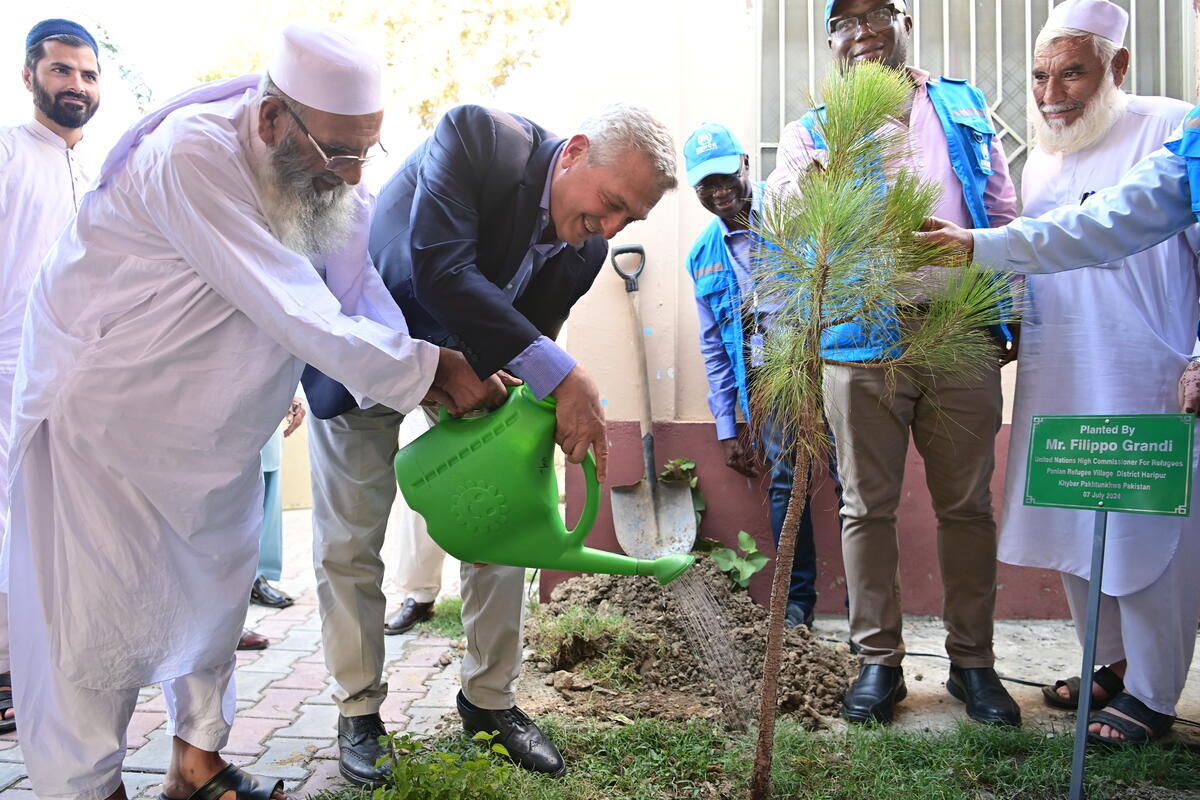Afghanistan Humanitarian Update No. 58
Afghanistan Humanitarian Update No. 58
27 March 2002
At a Glance
- Thousands made homeless following tremors
- Repatriation from Pakistan surpasses 100,000
- Repatriation from Iran set to start
Thousands made homeless following tremors
UNHCR is rushing aid into the areas of north-central Afghanistan that were hit by a strong earthquake Monday evening and successive aftershocks that destroyed and heavily damaged some 40 villages, reportedly leaving many thousands of people homeless.
U.N. refugee agency staff deployed to Nahrin, apparently the worst-hit town near the epicentre of Monday night's quake, report that the old town was completely destroyed and that rescuers were pulling many bodies from the rubble. Newer areas of Nahrin town were 40 percent destroyed, they said.
Damage is heavy in outlying areas of Nahrin District and neighbouring Burqa District, UNHCR was told. Local relief personnel told UNHCR that some 40 surrounding villages were severely affected by the tremors, with many homes destroyed.
On Wednesday, UNHCR staff in Kabul sent 11.6 metric tons of aid, including 56 family tents, 795 plastic tarpaulins and 900 jerry cans, aboard two heavy lift cargo helicopters belonging to the International Security Assistance Force (ISAF) to Mazar-i-Sharif. The items are being transferred to the affected regions of Baghlan Province by other ISAF helicopters.
Five truckloads of aid were also dispatched from UNHCR stockpiles in Kabul to Pul-I-Khumri Wednesday morning carrying tons of tents, plastic tarpaulins and jerry cans. This followed an earlier delivery on Tuesday evening of 1,200 plastic tarpaulins and 40 tents from Kabul. UNHCR's implementing partner in the affected region, ACTED, distributed 500 UNHCR tents in the hours immediately following the tremors. Pul-I-Khumri serves as the logistics hub for the region.
A UNHCR team joined a joint U.N. interagency mission that arrived in Nahrin on Tuesday morning to assess the damage. The Afghan interim authority has dispatched Enayatullah Nazeri, Minister for Repatriation, to oversee the relief operation. He was joined by the Ministers of Interior and Health. A number of Afghan government helicopters were also deployed in the hours after word of the disaster reached Kabul.
Also on Wednesday, a UNHCR-chartered Ilyushin 76 cargo aircraft carrying more than 14,000 blankets arrived in Kabul. UNHCR will distribute the newly-arrived items as needed to victims of the recent disaster.
Repatriation from Pakistan surpasses 100,000
More than 100,000 Afghan refugees have returned from Pakistan via the Takhtabaig registration centre near Peshawar since UNHCR, Pakistan and Afghanistan launched their joint repatriation programme on March 1. With more than 100,000 people repatriating in less than a month, the initiative is on track to surpass the 400,000-person target from Pakistan for 2002 initially planned.
Some 10,025 Afghans turned up on Wednesday in 654 vehicles to register for the repatriation aid, representing some 1,880 families. UNHCR screeners at Takhtabaig turned back 529 families who approached Takhtabaig seeking to be registered, as their interest in return did not appear to be genuine.
The Afghan refugees registered at Takhtabaig, in Pakistan's North-West Frontier Province, repatriated via the centuries-old Khyber Pass between Pakistan and Afghanistan. U.N. refugee agency staff in Pakistan plan to open several additional registration centres in the next week.
Each Afghan participating in the programme receives $20 from UNHCR to finance their transport homewards. Families get a return kit containing blankets, quilts, cooking and heating stoves, a plastic tarpaulin, a jerry can and bucket, hygienic supplies, tools and other items to ease their reintegration.
UNHCR cautions Afghans returning home to avoid parts of Afghanistan still experiencing insecurity, ethnic tension, or those areas heavily affected by land mines and unexploded ordnance. Afghans from earthquake-affected Baghlan Province are also cautioned.
Repatriation from Iran set to start
Authorities from Iran and Afghanistan plan to meet next Wednesday, April 3 in Geneva to sign, together with UNHCR, a tripartite agreement on return.
Registration centres have already been set up in Teheran and elsewhere throughout the country. UNHCR and the Iranian authorities have been working feverishly to prepare facilities at the Dogharoun and Milak crossing points where refugees will undergo mine awareness training and shift their belongings onto locally-contracted vehicles on the Afghan side, at Islam Qala and Zaranj respectively.
UNHCR expects to kick off returns from Iran beginning on April 9. Afghans participating in the voluntary repatriation initiative will receive transport up to the frontier with Afghanistan. UNHCR will give returnees $10 to finance their transport homewards, plus the same family kit already being distributed to Afghans repatriating from Pakistan. The transport allowance is lower than that from Pakistan as the refugees are transported up to the frontier.








